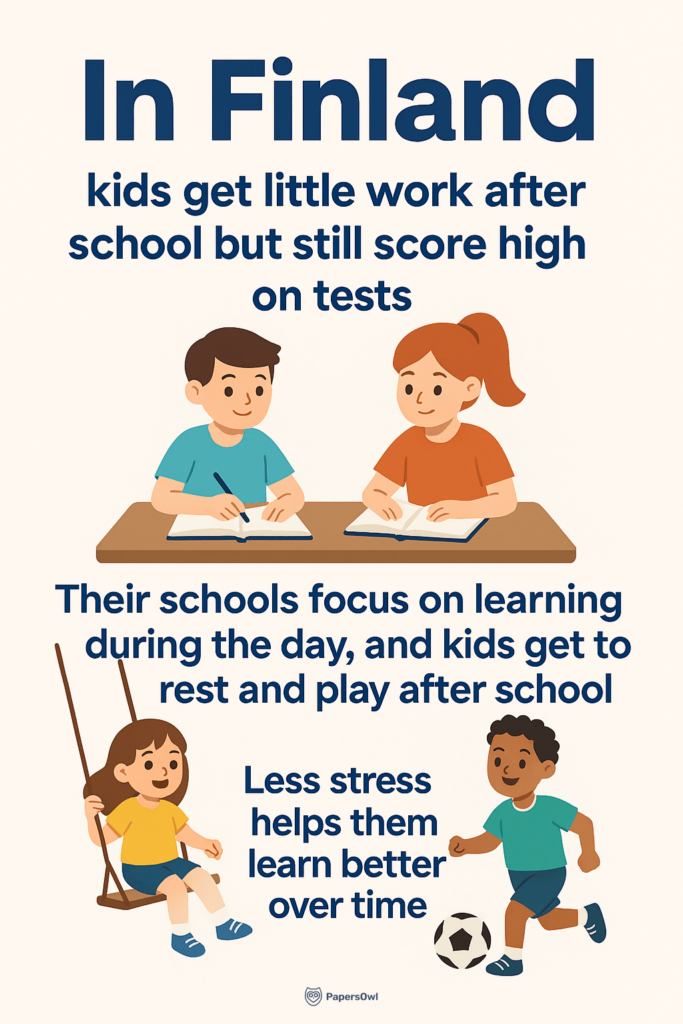Why Homework Should Be Banned: 10 Strong Reasons
Table of contents
- 1 Why Do We Need to Talk About This Problem?
- 2 10 Reasons Learners Should Be Free From Homework
- 2.1 1. It Increases Stress and Anxiety.
- 2.2 2. It Disrupts Family Life and Bonding.
- 2.3 3. It Steals Time for Rest, Play, and Hobbies.
- 2.4 4. It Ruins Sleep Schedules.
- 2.5 5. It Magnifies Social Inequality.
- 2.6 6. It Kills Motivation and Curiosity.
- 2.7 7. It Causes Family Conflicts.
- 2.8 8. It Fails to Improve Academic Performance.
- 2.9 9. It Damages Student-Teacher Relationships.
- 2.10 10. It Doesn’t Prepare Students for Real Life.
- 3 Why Should There Be an Elimination of Homework in Modern Schools?
- 4 Common Arguments for Homework and Why They Fail
- 5 What Should Replace Homework?
- 6 Let’s Leave Old Homework Habits Behind!
- 7 Sources
Work given at home has been a big part of school for many years. However, more people are starting to ask why we still do it. Many children feel stressed, tired, and overwhelmed. Parents also feel the pressure of assistance. Researchers now say it’s time to stop homework. The truth is, it may not help as much as we think. It might even hurt pupils. When the workload becomes too much, students often search for do my assignment online options to manage better.
This article will explore why homework should be banned and what schools can do instead. Let’s examine the facts, the problems, and the ways to help students learn.
Why Do We Need to Talk About This Problem?
Take-home tasks have long been part of school life. Tutors assign them, learners expect them, and parents often help or ask about them.
If homework is supposed to help us learn, why is it burning students out?
Many consider that learning at home enhances academic results. The truth is more complex. Some homework might help in certain situations, but too many tasks can be harmful, especially for younger pupils. Therefore, the education system must consider what helps learners study and grow.
Besides, we now know much more about mental health, family life, and how students learn. Educational research shows that long hours spent completing homework may not help students succeed. Instead, excessive assignments often cause stress, burnout, and lost time. They can harm emotional well-being, family relationships, and even academic performance.
It’s time to stop and think: why should students not have homework? Could this help them learn better and enjoy school life?
10 Reasons Learners Should Be Free From Homework
1. It Increases Stress and Anxiety.
Too much workload is one of the most significant reasons students feel overwhelmed. A study from Stanford University found that 56% of respondents said homework was their number one source of stress. Only 1% said it wasn’t a stressor at all. That’s a big deal!
The American Psychological Association also found that high school students report stress levels that are similar to adults. When teens are stressed for too long, they may struggle with sleep, headaches, and lose weight. They feel constant pressure to get things done, especially when there’s extensive homework night after night. Thus, many students feel anxious, sad, and even depressed. This seems like the essential reason why kids should not have homework.
2. It Disrupts Family Life and Bonding.
Assignments don’t just stress students. They also influence families. Many say homework disrupts families and ruins evenings. Instead of dinner or a walk, nights can turn into fights and frustration. One mom said her child cried every night over elementary homework. Another family said they had no time for fun, only stress. Unfortunately, anxiety grows with every new homework assignment.
3. It Steals Time for Rest, Play, and Hobbies.
Kids need time to rest, play games, and just be themselves. They should have time after school to read for fun, spend outside, or enjoy hobbies like drawing or playing video games. These activities support mental health, emotional growth, and even brain development.
Some people ask, is homework beneficial when it takes away from these important parts of growing up? According to the National Center for Education Statistics, students in extracurricular activities attend school more, do better academically, and are more likely to enter college.

4. It Ruins Sleep Schedules.
Excessive school workload can mess up sleep. Students often stay up late completing homework, especially in middle school and college. The CDC says nearly 7 in 10 high school students don’t get enough sleep on school nights — about 73%. Sleep deprivation can lead to poor focus, mood problems, and even physical illness.
If a student gets home at 4 p.m., goes to a club, eats dinner, and starts homework at 8 p.m., they might be up until midnight. That’s unhealthy for growing minds or bodies, which is a significant reason why we shouldn’t have homework.
5. It Magnifies Social Inequality.
Assigning after-school tasks to all students assumes they all have the same resources. But that’s not true. Some kids have quiet homes, Internet access, and parents who can help. Others may live in noisy homes, lack tech, or have to babysit siblings.
Educational institutions should not ignore these gaps. When students can’t complete tasks, it affects their grades and confidence. Homework assigned without support can make poor kids fall further behind.
6. It Kills Motivation and Curiosity.
Learning should be exciting, not exhausting. However, repetitive tasks make it boring. Kids lose their love for learning when it feels like a chore. This leads to academic burnout, where students are too tired or discouraged to care anymore.
When kids feel forced to do something, they naturally resist it. They don’t explore, ask questions, or try new things. This hurts their general academic knowledge in the long run.
7. It Causes Family Conflicts.
We’ve all heard of “homework wars.” Parents nag → Kids cry → Fights break out. It’s stressful for everyone. Moreover, some families might need family therapy because of the pressure caused by homework policies.
One father said he started dreading evenings because of the fights over homework assigned to his daughter. A mother shared that she stopped assisting altogether to protect their relationship.
Indeed, study tasks can create division at home instead of connection. And this argument is one of 10 reasons why students should not have homework.
8. It Fails to Improve Academic Performance.
Does homework help learners do better? Not always.
Research by Alfie Kohn, The Homework Myth, shows that elementary students have no real proof that homework boosts academic performance. Even Harris Cooper, in his book The Battle Over Homework, who once supported the necessity of assignments, found that it only helps older students and only a little.
Too many traditional tasks can actually lower students’ academic achievement. That’s why the National Education Association and the National Parent Teacher Association both recommend fewer tasks at home, especially in the early grades.
9. It Damages Student-Teacher Relationships.
When students feel buried under assignments, they may start blaming their teachers. Some feel like teachers don’t understand how hard it is to complete tasks after a long school day, and how to motivate yourself to do school work. This can turn the teacher into the “bad guy.”
A student should feel like the teacher is on their side. In the meantime, that bond starts to break if they’re getting marked down or scolded for late work.
10. It Doesn’t Prepare Students for Real Life.
Some say homework teaches responsibility. Yet, real life is more than writing essays at midnight or answering math questions on a worksheet. It’s about solving problems, talking to others, and learning hands-on.
Kids should acquire practical and essential life skills like time management and teamwork. However, after-school assignments almost always take away time from real-life learning and out-of-class activities.
Why Should There Be an Elimination of Homework in Modern Schools?
Today’s schools are changing. First of all, teachers and parents understand that student comfort matters. The goal now is excellent grades and happy, healthy, talented pupils. More schools are agreeing that a homework ban could be a good idea.
Finland is a great example. Students there get very few elementary school tasks. Still, they rank high in academic results. Their education system focuses on learning during school hours, not at home.
In the U.S., P.S. 116 in New York stopped giving homework assignments to elementary students and saw better mental health and more family time. California also passed laws to reduce excessive homework, especially for younger students.
In Canada, the Toronto School Board tested less homework and found it helped the general school-life balance. These changes show that eliminating homework can lead to happier, healthier students and better results.
Common Arguments for Homework and Why They Fail
🧩 Homework Builds Discipline and Responsibility
Today’s education system offers better ways to nurture self-management. Kids learn life skills like focus and time control through out-of-class activities, group work, or helping at home.
🧩 It Raises Test Scores
This is a myth. Numerous top countries give little to no homework and still do well on standardized test scores.
🧩 Practice Is Necessary
Yes, but it doesn’t need to be extra work at home. Practical activity can happen in class with help from the teacher.
🧩 It Prepares Students for College
Not all kids go to college. And early assignments don’t match college tasks. Students must learn thinking, teamwork, and time management, not just do more schoolwork.
What Should Replace Homework?
Now that you understand why there should be no homework, let’s consider more useful options that support real learning. Here are better ways to help students grow:
- Start creative or group projects that build teamwork and problem-solving.
- Read for enjoyment, not just for grades.
- Join clubs, sports, or music groups to build life skills and confidence.
- Give more time during school hours for teachers to guide learning directly.
- Encourage self-led learning, where students choose topics they care about.
These changes help college students build independence, improve academic success, and enjoy learning more. The education system should focus on school learning during the day, not repetitive assignments at night. It’s time to leave behind the homework myth and support smarter learning methods.
Let’s Leave Old Homework Habits Behind!
The great homework debate shows no signs of ending. But the truth is clear: excessive tasks do more harm than good.
Teachers, you work hard every day to help pupils learn. Don’t let old rules get in the way.
Students, your time, health, and joy matter too.
And parents, you see the stress, the tears, the family stress that comes from endless assignments.
After-school work should not take over the general balance of school life. It shouldn’t replace rest, play, or time with loved ones. It shouldn’t harm mental health or add pressure that breaks kids down either.
Educational principles change. Let’s move away from outdated policies and build a better future for students. One where learning happens during school hours, and students have time to be kids after class.
Talk to your school. Offer the facts. Seek better solutions.

Sources
- Can take-home assignments contribute to improved academic performance? – Forget Homework. Slate, September 14, 2006, https://slate.com/human-interest/2006/09/elementary-school-students-shouldn-t-do-homework.html.
- What consequences have teens with constant stress due to excessive workload? – Is Homework a Necessary Evil? American Psychological Association, https://www.apa.org/monitor/2016/03/homework.
- Do extracurricular activities help with learning and grades? – O’Brien, E., & Rollefson, M. (1995, June). Extracurricular Participation and Student Engagement. Ed.gov; National Center for Education Statistics, https://nces.ed.gov/pubs95/web/95741.asp.
- What impact has insufficient sleep on children and high school students? – Sleep Facts and Stats. The Centers for Disease Control and Prevention, https://www.cdc.gov/sleep/data-research/facts-stats/index.html.
- Why students should not have homework and how it increases anxiety. – Stanford Research Shows Pitfalls of Homework. Stanford Report, March 10th, 2014, https://news.stanford.edu/stories/2014/03/too-much-homework-031014.







